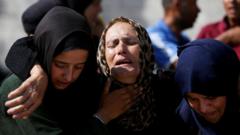Hamas has announced a "positive response" to US-mediated proposals for a ceasefire and hostage release deal. As the violence persists, the humanitarian crisis exacerbates, raising concerns for the remaining hostages.
Hamas Presents 'Positive Response' to Ceasefire Proposal Amid Ongoing Conflict

Hamas Presents 'Positive Response' to Ceasefire Proposal Amid Ongoing Conflict
In a statement, Hamas indicates readiness for negotiations on a ceasefire deal addressing hostages and humanitarian aid in Gaza while Israeli airstrikes continue.
In an evolving landscape of conflict and diplomacy, Hamas expressed optimism regarding the latest ceasefire proposal presented by the U.S. authorities. The group stated its openness to enter negotiations immediately, although no formal acceptance of the proposal has been confirmed as of yet.
The plan reportedly entails a 60-day ceasefire during which negotiations would be held to conclude the ongoing conflict, with provisions for the staggered release of living Israeli hostages alongside the return of deceased hostages’ remains. Importantly, Hamas demands an immediate resumption of unrestricted food and medical aid into Gaza, facilitated by both the United Nations and the Red Cross. The proposal also hints at a phased withdrawal of Israeli military presence in specific areas of Gaza.
Donald Trump highlighted that he anticipated a response from Hamas within a day. This potential agreement, should it progress positively, could pave the way for formal indirect talks, particularly ahead of Israeli Prime Minister Benjamin Netanyahu’s upcoming visit to Washington.
As negotiations are hoped for, horrors of the ongoing conflict continue to unfold, with the Hamas-run Gaza health ministry reporting at least 138 Palestinians killed in the last 24 hours due to Israeli airstrikes. In one such incident, strikes on two makeshift shelters in Khan Younis resulted in multiple casualties, eliciting cries for peace from grieving relatives.
Organizations like the Red Cross and Médecins Sans Frontières cited alarming conditions as violence escalates. A Red Cross staff member was injured, describing the violence as "unacceptable", while MSF reported the tragic killing of a former colleague amidst fierce bombardments.
In Tel Aviv, families of hostages gathered to rally for their loved ones' release, urging American intervention in shaping a deal. Voices of personal tragedy resonated as they called for a comprehensive agreement to reunite families and pave a smoother path towards peace.
As the narrative unfolds, apprehensions remain among Israelis regarding the fate of hostages and possible military escalations. Netanyahu expressed his commitment to secure the safe return of all hostages but maintained that military action won't cease until the underlying threats are addressed thoroughly. The toll of the conflict has devastated Gaza, with reports indicating over 57,130 fatalities since the onset of hostilities.
The current situation illustrates the fragile balance between ongoing violence and the daunting hope for resolution amidst a tragedy that has claimed innumerable lives on both sides.
The plan reportedly entails a 60-day ceasefire during which negotiations would be held to conclude the ongoing conflict, with provisions for the staggered release of living Israeli hostages alongside the return of deceased hostages’ remains. Importantly, Hamas demands an immediate resumption of unrestricted food and medical aid into Gaza, facilitated by both the United Nations and the Red Cross. The proposal also hints at a phased withdrawal of Israeli military presence in specific areas of Gaza.
Donald Trump highlighted that he anticipated a response from Hamas within a day. This potential agreement, should it progress positively, could pave the way for formal indirect talks, particularly ahead of Israeli Prime Minister Benjamin Netanyahu’s upcoming visit to Washington.
As negotiations are hoped for, horrors of the ongoing conflict continue to unfold, with the Hamas-run Gaza health ministry reporting at least 138 Palestinians killed in the last 24 hours due to Israeli airstrikes. In one such incident, strikes on two makeshift shelters in Khan Younis resulted in multiple casualties, eliciting cries for peace from grieving relatives.
Organizations like the Red Cross and Médecins Sans Frontières cited alarming conditions as violence escalates. A Red Cross staff member was injured, describing the violence as "unacceptable", while MSF reported the tragic killing of a former colleague amidst fierce bombardments.
In Tel Aviv, families of hostages gathered to rally for their loved ones' release, urging American intervention in shaping a deal. Voices of personal tragedy resonated as they called for a comprehensive agreement to reunite families and pave a smoother path towards peace.
As the narrative unfolds, apprehensions remain among Israelis regarding the fate of hostages and possible military escalations. Netanyahu expressed his commitment to secure the safe return of all hostages but maintained that military action won't cease until the underlying threats are addressed thoroughly. The toll of the conflict has devastated Gaza, with reports indicating over 57,130 fatalities since the onset of hostilities.
The current situation illustrates the fragile balance between ongoing violence and the daunting hope for resolution amidst a tragedy that has claimed innumerable lives on both sides.




















